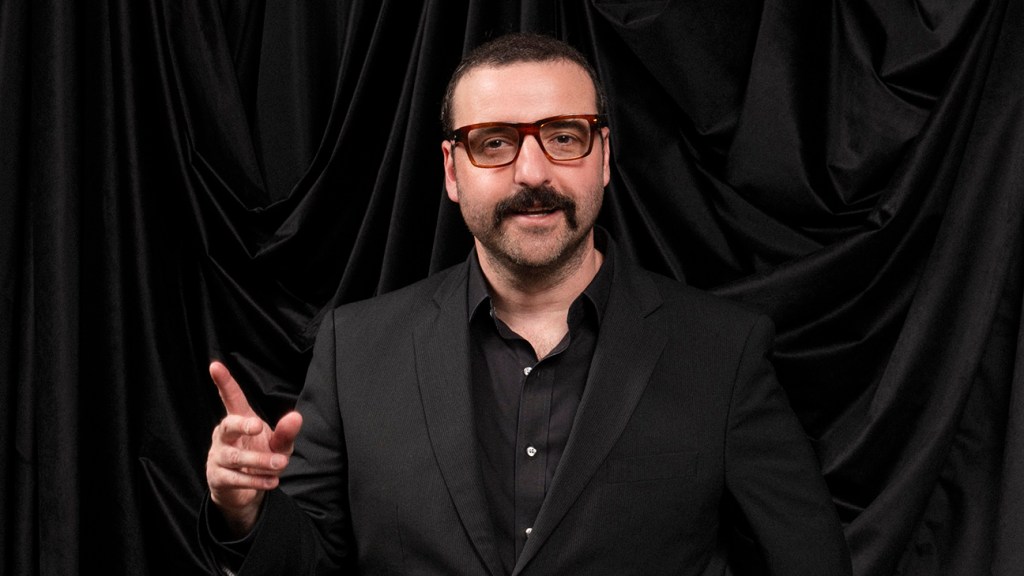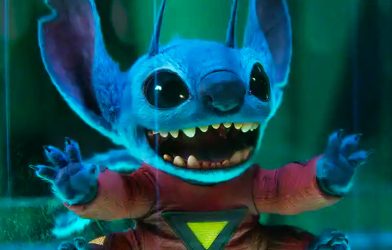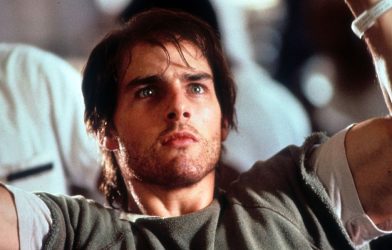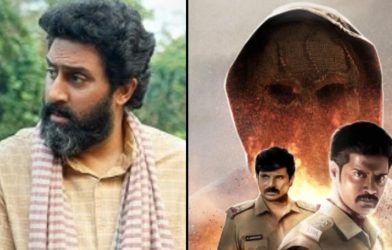
David Krumholtz
Owen Kolasinski/Academy Museum Foundation/Getty Images
A kind word from Christopher Nolan meant everything to David Krumholtz circa 2007 and beyond. It’s a story that sounds a lot like Bruce Wayne’s final admission to Commissioner Gordon in Nolan’s The Dark Knight trilogy, as you never know just how impactful a random act of kindness can be for someone else. Roughly 17 years ago, the now Oscar-winning filmmaker was scouting for The Dark Knight at Los Angeles Center Studios, and Krumholtz happened to be there, shooting Numbers. That’s when Nolan approached the actor and paid him an unexpected compliment regarding his performance as mathematical genius Charlie Eppes on the hit CBS show.
From there, Krumholtz couldn’t help but hold out hope that Nolan would cast him someday, and the opportunity finally came in the form of Oppenheimer’s Isidor Isaac Rabi, a Nobel Prize-winning physicist and endearingly loyal friend to J. Robert “Oppie” Oppenheimer (Cillian Murphy).
“Ninety-nine percent of these interactions lead to nothing, at least in my experience. So, for Chris to be the guy who remembered and thought, ‘I’m going to put him in something,’ it means the world to me. He remembered and he didn’t forget me. So he hooked me up, and I owe him a great debt of gratitude,” Krumholtz tells The Hollywood Reporter.
In Nolan’s adaptation of Kai Bird and Martin J. Sherwin’s American Prometheus, Rabi served as one of the few people in Oppenheimer’s life who truly had his back. He not only reminded him of his morality and where he came from, but he also seemingly had a peeled orange on him at all times, knowing that Oppie was too lost in his own thoughts to remember to eat. Thus, Krumholtz’s Rabi became the heart and soul of a film that was filled with cold-hearted and calculated physicists, politicians and bureaucrats.
Krumholtz was cast in the role at the same time that he was finishing his new black comedy, Lousy Carter, written and directed by Bob Byington. The New York native plays Lousy Carter, a washed-up literature professor who’s given six months to live due to terminal illness. So with the time he has left, he decides to take some misguided chances, and also make a half-hearted attempt at reconciling his many failed relationships, including one with his ex-girlfriend Candela (Olivia Thirlby).
When Krumholtz was the first castmember to arrive at a Sante Fe casino-hotel to begin the journey of Oppenheimer, he found unforeseen comfort in a familiar face he had just worked with on Lousy Carter.
“We were staying at a Santa Fe casino-hotel called Buffalo Thunder, and I realized I was the only one there from the cast at a certain point, so it kind of freaked me out. I even called my wife to say, ‘I’m the only one here and I’m lonely,’” Krumholtz recalls. “So I was in the parking lot, and, out of nowhere, I saw Olivia Thirlby in the parking lot. And I said, ‘What the hell are you doing here?’ We had just worked with each other [on Lousy Carter] maybe two months prior, and she was like, ‘I got Oppenheimer, too!’”
Oppenheimer released a week into the four-month-long SAG-AFTRA strike, and while Krumholtz’s performance immediately became a fan favorite across social media, the strike rules prevented him from making the promotional rounds and reveling in his most prestigious film role to date. The epic historical drama would go on to gross nearly $1 billion and win seven Oscars, including best picture, but Krumholtz admits that he’s yet to receive the career boost that one would expect from a prominent role in the defining film of 2023.
“It’s one of those things, man. Sometimes, I don’t understand it. Sometimes, I do. But it’s been slow. We’re coming off a strike. There’s not a lot going on,” Krumholtz says. “The hardest part of being in the film that won everything and made $1 billion is that you go into this place of expectation. It’s righteous expectation, but the problem is when it doesn’t pan out or it isn’t panning out, you start to really lose your shit and fall into resentment. So I can’t let that happen because, ultimately, it hurts me and it hurts my acting and it hurts my family. So I am trying to be as patient as possible, but there’s no one banging at the door, currently.”
Below, during a recent conversation with THR, Krumholtz also discusses how his bout with thyroid cancer in 2011 informed his performance as Carter, before reflecting on working with Heath Ledger and Joseph Gordon-Levitt on 10 Things I Hate About You.
It’s been an eventful past year, so when did Lousy Carter take place?
We shot it in December of 2021. It was right before Oppenheimer. During the last week of filming Lousy Carter, I flew to L.A. overnight to meet with Chris Nolan and audition for him, and then I came back with job in hand. And so Lousy Carter ended with me knowing that I was about to do Oppenheimer.
Your “Oppenhomies,” Macon Blair and Olivia Thirlby, are also in Lousy Carter. According to Cillian Murphy, Olivia actually coined the term Oppenhomies. But I wrongfully assumed that you called them for Lousy Carter after shooting Oppenheimer together.
We were staying at a Santa Fe casino-hotel called Buffalo Thunder, and I realized I was the only one there from the cast at a certain point, so it kind of freaked me out. I even called my wife to say, “I’m the only one here and I’m lonely.” So I was in the parking lot, and, out of nowhere, I saw Olivia Thirlby in the parking lot. And I said, “What the hell are you doing here?” We had just worked with each other [on Lousy Carter] maybe two months prior, and she was like, “I got Oppenheimer, too!” So that was a cool feeling. And, with Macon, Bob Byington just has some really good taste. He and Chris Nolan have the same sensibilities, I guess.
This won’t make sense to people who haven’t seen the movie, but did you scream the name “Dick Anthony” in dramatic fashion when you saw Macon?
(Laughs.) Macon was shaved when I saw him, and so it took me a second [to recognize him].
Yeah, he looks wildly different in each movie. You and Martin Starr also have quite a history.
Yeah, Martin and I have done everything, including strange little short films. Martin is in my short film that I co-wrote and directed; it’s called Big Breaks (2009). Martin plays a barista in it, and he’s very funny in it. I was actually with Martin yesterday. I love him. Martin is my dear, dear boy.

David Krumholtz in Lousy Carter.
Courtesy Magnolia Pictures
For as long as I can remember, my dad has been telling a particular Henny Youngman joke, and it happens to be the “six months to live” joke that Carter tells at the start of this movie. [Carter’s version is: “Doctor gives a guy six months to live. He can’t pay his bill, doctor gives him another six months.”] Well, life then imitates art for Carter, as his doctor hands him a six-month death sentence, and he can’t pay his bill. Now, you had your own health scare in 2011, so did you revisit a lot of those memories of having thyroid cancer to use as Carter?
I actually thought about it quite a bit. I don’t know if I used [those memories] consciously or subconsciously, or if the trauma of that was just there, but I was aware that I had earned the right to play the role of someone who was potentially going to die because I had had that experience. So I did let it inform the performance a bit.
He didn’t have a great relationship with his single mom who raised him. His most significant relationship didn’t work out, nor did his preferred career. He then betrays his best friend. Is underachievement to blame for most of his failings?
When his animated short blew up, I imagine that he became a total asshole to everyone in his life. He did not handle his notoriety well. He abandoned people, and when the rug was pulled out from under him, he then had to repair relationships with these people. If you listen to the dialogue in the film, his best friends, his ex-girlfriend [Thirlby], everyone says some really nasty shit about him. (Laughs.) He is not well liked by the people closest to him. Even his mother has harsh opinions about him, and so he’s a guy doing the best he can with what he has around him. He hasn’t made an effort to make new friends, but my feeling is that he probably earned all of the vitriol that he gets from the people around him.
So he’s relieved in a way to find out he’s dying, because the best part of his life is behind him and he doesn’t believe that there’s a better part coming. When I read the script, I called Bob and said, “If I do this, I want to play him as totally relieved. I don’t want to play the neurosis or the burden of a guy that’s dying.” In a way, the character is sociopathically silent about knowing he’s going to die. He doesn’t tell many people, except his ex-girlfriend, and other than that, he’s got this little secret that he’s enjoying, because the result is that they’re all going to miss him when he’s gone. So there’s some satisfaction in that for him, and it is sociopathic. It’s very strange, but he’s a very strange guy.

David Krumholtz in Lousy Carter.
Courtesy Magnolia Pictures
He’s also preoccupied with The Great Gatsby. It’s the focus of his literature course. But do you think he ultimately misunderstood it?
That’s a really good question, and, in the sense that he sees Gatsby as a sympathetic hero-type character rather than an example of bourgeois behavior gone bad, then yes, in a way. But what did [F. Scott] Fitzgerald intend? Did he write a novel about an antihero or a real hero? What is the nature of Gatsby? So that’s the big question of The Great Gatsby and it has been for many years. It’s a great mystery just like it is with Lousy, and that’s what’s brilliant about Bob’s script. We just don’t know if Lousy is a good person or a bad person, and he doesn’t need to be either one, in a way. He just exists. We don’t know how to root for him or be sympathetic toward him or to hate him or be annoyed by him. So there are a lot of parallels between what Fitzgerald wrote and what Bob Byington wrote as this little comedy.
The bowling alley memorial for Carter’s mother is so specific that it seems personal. Do you know if there’s a story behind that?
I don’t know if Bob has been to [a bowling alley memorial] or not. I do know that portions of this film are as close to autobiographical as anything he’s ever written before, but asking Bob questions like that would require me to talk to Bob. And I try to do as little of that as possible.
Well, congratulations on having an integral role in a best picture-winning film. I genuinely thought Rabi was the heart and soul of Oppenheimer. He was the angel on Oppie’s shoulder and his moral reminder. Did you and Chris ever talk about him in similar terms, or did he let the text speak for itself?
He let it speak for itself. All I really had to do was understand that and bring empathy to it. Every moment of my performance was all very calculatedly written. I made no choices. It was all very clearly built for me to fill that role and be the heart of the film, if you will. And it wasn’t easy, because you want to do that in a not-so-obvious way, in a not-so-cliché way that you’ve seen a thousand times before. And if I give myself any credit for that performance — and I don’t give myself much — but if I give myself any credit, it’s because I wasn’t doing the very obvious version of that. It’s why I was cast. I did a more nuanced, subtle thing with it. That was the only choice I made, and all credit is really due to the writing in this particular case of Rabi in Oppenheimer.

Cillian Murphy (left) as J. Robert Oppenheimer and David Krumholtz as Isidor Rabi in Oppenheimer.
Melinda Sue Gordon/Universal Pictures
You bumped into Chris approximately 17 years ago while he was scouting The Dark Knight in Los Angeles, and he happened to recognize you from Numbers. He even complimented your performance as Charlie Eppes. This is not meant to be a slight toward that show, but I honestly didn’t expect the bastion of cinema to be well-versed in network television.
It was lovely at the time, and many of the “Mr. Cinemas” watch a lot of television. I’ve had a few of these [encounters], luckily, where you meet a filmmaker who you deeply admire and they say, “Well, I know who you are, actually, and you’re great, too.” And you just go, “Holy crap! Wow. Thank God these people have seen my work.” And then your next thought is, “I hope I get to work with them.” And 99 percent of these interactions lead to nothing, at least in my experience. So, for Chris to be the guy who remembered and thought, “I’m going to put him in something,” it means the world to me. It really does. He remembered and he didn’t forget me. So he hooked me up, and I owe him a great debt of gratitude.

From left: Heath Ledger, David Krumholtz and Joseph Gordon-Levitt in 10 Things I Hate About You (1999).
Richard Cartwright/Buena Vista Pictures/Courtesy Everett Collection
A recent viral tweet included a photo of you, Joe Gordon-Levitt and Heath Ledger on the set of 10 Things, and the accompanying message was: “Something tells me Christopher Nolan enjoyed 10 Things I Hate About You,” given that he’s now worked with all three of you. How much do you remember from those days back in ‘98?
Even though we were all wildly stoned, I still remember everything because it was magical. From day one, we all realized that we shared the same language and that we all had a wonderful rapport. It was not only one-on-one with each other, but also as a group. We just loved each other from day one, which is what makes that movie work to this day, I believe. You really get the sense that we enjoyed working with each other, and we did. We just all knew that we were all coming at this from a very similar place in our lives and our intentions.
Heath actually showed up a week after we had all met. He was late because he was shooting something else, and there was a big discussion about it: “I hope he’s a nice guy. I hope he’s normal. I hope he’s not a dick.” And what we got instead was the leader of the group. We got someone who was everything that the group was, but more. And so it was this exclamation point on our experience together. It was like, “Wow, man. All of us are awesome.” We had so much confidence in each other and love for each other that the movie did not feel like work. It was the least like a working experience that I’ve ever had. It was just fun. And I love and continue to love every single one of those actors.
Is there anything I can say to get you back on Twitter? [Krumholtz had a recent stretch where he posted multiple career stories in fine detail, and they all went viral until he abruptly deactivated his account.]
Who says I’m not on Twitter? (Krumholtz smiles.)
Can you feel the Oppenheimer difference already? Is your inbox bustling these days?
I’ll just say no.
Really!? I find that hard to believe.
So do I. It’s one of those things, man. Sometimes, I don’t understand it. Sometimes, I do. But it’s been slow. We’re coming off a strike. There’s not a lot going on.
Your Oppenheimer audition went so poorly in your mind that you immediately started drowning your sorrows, and as you were drowning your sorrows, you got the call with the good news. So maybe there’s more good news right around the corner.
That’s the nature of this beast, for me. I’m a journeyman actor who consistently has to find ways to prove himself. Is it a burden? Yeah, it’s a burden, sometimes. I wish it was easier. So I’m trying to stay out of expectation. The hardest part of being in the film that won everything and made $1 billion is that you go into this place of expectation. It’s righteous expectation, but the problem is when it doesn’t pan out or it isn’t panning out, you start to really lose your shit and fall into resentment. So I can’t let that happen because, ultimately, it hurts me and it hurts my acting and it hurts my family. So I am trying to be as patient as possible, but there’s no one banging at the door, currently. That might change tomorrow, and I’m used to things changing on a dime, but, as of today, it’s a little less than I expected. So, hopefully, that changes. I mean, what am I going to do? Freak out?
It’s going to change.
I hope so. I consider myself a knowledgeable filmmaker, and you just hope other people feel the same — that not every performance is a fluke.
***
Lousy Carter is now available in select theaters and on VOD.









